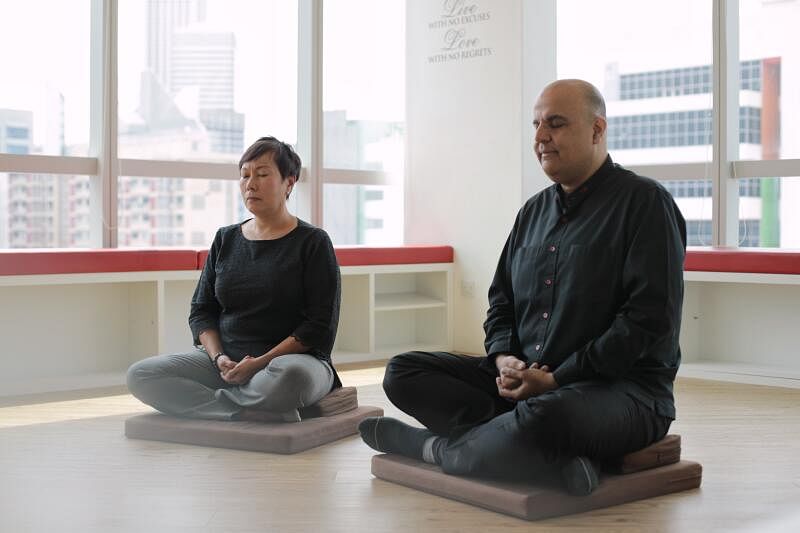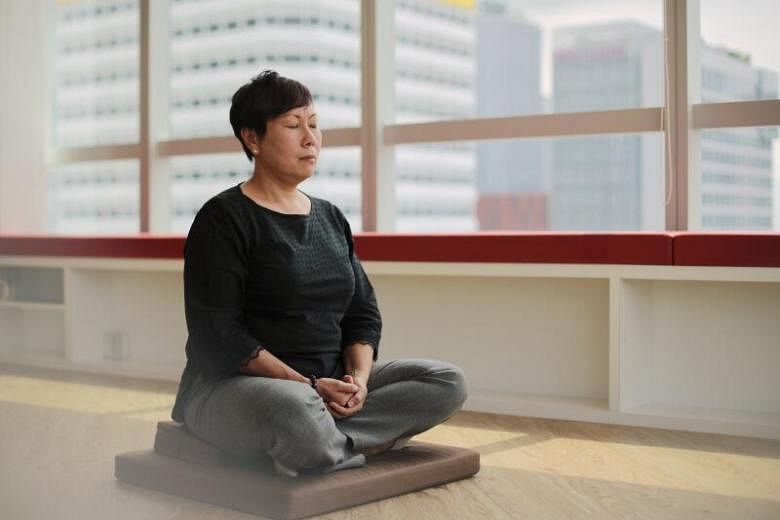SINGAPORE - When Ms Janet Tay was told she had been retrenched from her job as a director in a hospitality company in September, the 57-year-old was calm and composed.
But it was very different for her last year - she was highly stressed at work and easily irritated. She also had trouble sleeping and frequent eczema flare-ups.
To improve her health, she joined a meditation programme at SoulCentre in January. Since then, she has been practising meditation at least twice daily. It has helped her to calm her mind and manage her emotions better.
"I do feel a slight sense of loss (about the retrenchment), but it is natural. Meditation has helped me to take the emotion, process it, think why I am feeling this way, recognise it, accept it, and move on," said Ms Tay, who is single.
Meditation is a practice in which a person uses a technique to focus the mind on a particular object, thought or activity, so as to train attention and awareness, and achieve a mentally clear and emotionally calm and stable state.
According to studies, the benefits of meditation include reduced stress and anxiety, lower blood pressure, increased self-esteem and better concentration.
Across the Asia-Pacific, more people are coping with the Covid-19 pandemic by turning inwards and meditating, according to a study by digital health company Fitbit, which makes health tracking devices.
A Fitbit research team analysed aggregated, anonymous population-level data from millions of Fitbit users aged 18 to 80 across the globe from March 1 to Aug 31, compared with the same period last year. These included data on step counts, active minutes and activity types.
In the Asia-Pacific, a lot more people took to meditation, yoga and pilates this year, the study found, with meditation, in particular, seeing massive gains in popularity among Fitbit users.
In Singapore, participation in meditation among Fitbit users jumped by a whopping 6,128 per cent. Fitbit was unable to give a breakdown of the number of Singapore users in the study.
Ms Sophia Goh, a counsellor and psychotherapist at Sofia Wellness Clinic, said there has been a greater focus on mental wellness and stress management among Singaporeans this year.
"People are experiencing emotional distress due to anxiety and fears brought about by the Covid-19 pandemic, such as uncertainty about the future, financial challenges, and increased family tension. This explains why more are turning to activities such as meditation to feel calm," she said.
At least three meditation centres here which offer a mix of in-person and remote classes have seen an increase in people taking part in meditation programmes.
SoulCentre, for example, reported a 40 per cent increase since July, when it reopened its centre.
Its co-founder and managing director, Ms Sally Forrest, said workers from the banking, retail, food and beverage sectors, as well as doctors, are turning to meditation to cope with the challenging times.
"Apart from the stress at work, clients say they are not confident living with the unknown. People are used to being in control of their diaries and planning things, and suddenly, they cannot do this with confidence," said Ms Forrest.

Meditation centre The Golden Space has seen a 25 per cent increase in clients since May.
Ms Yii Hui Lee, a meditation teacher at the centre, said people were forced to slow down during the pandemic and think about how to take better care of themselves.
She said: "Meditation came up as one of the wellness options that people could try. There were many clients who came in feeling lost, isolated and uncertain about what the future holds. This caused sadness and anxiety and that is when people turned to meditation."
Meditation, she noted, is especially helpful for people who are emotionally overwhelmed and tend to sweep their feelings or problems under the carpet.
"The practice allows such individuals to process negative emotions and release them," she said.
With virtual classes now part and parcel of offerings at meditation centres, some have had to make adjustments.
Ms Michele Chong, managing director at The Golden Space, has been conducting sleep sound therapy sessions online since April, bought four microphones to aid her in teaching virtually.
She uses instruments such as singing bowls, crystal bowls, tuning forks and koshi (wind chimes) to create sounds to "calm overactive brain waves" for those with insomnia and frequent migraines due to high levels of stress.
"Depending on the pitch, the sounds can help people to relax or trigger trapped emotions such as anger and sadness and help to release them," said Ms Chong.
Over at Brahm Centre, a mental wellness charity, there has been a rise in sign-ups for its five-day mindfulness retreats.
Adjunct Associate Professor Angie Chew, chief executive officer and principal at Brahm Centre, said: "Before the pandemic, there would be about 25 people signed up but now there are 70 to 80 people signing up for the retreats."
She conducts these retreats at hotels for 50 people on site, with the rest on video-conferencing platform Zoom.
Owner of SmileArts Dental Studio, Dr Kenny Wong, who attended a mindfulness course at Brahm Centre in September when he was anxious and distressed, said meditating has helped him to overcome his negative emotions and feel more relaxed.
"There was a lot of stress at work because revenue had reduced significantly. This was due to a drop in patients during the circuit breaker when we weren't allowed to do many procedures," said the father of two children, aged four and 11.
Now, the 43-year-old ensures that he meditates 20 minutes every morning and in between consultations with his patients.
Apart from in-person meditation programmes, there are many popular meditation apps. They include Calm and Headspace, both of which have over 40 million downloads each.
These apps teach relaxation techniques that aim to ease symptoms of anxiety, depression as well as promote better sleep.
Though they can be useful as an introduction to meditation, experts say they are not substitutes for learning from certified or experienced teachers.
Ms Yii observed that attending a class in person makes people feel more relaxed and recharged.
Amid the pandemic, Dr Wong said meditating has helped him accept that "whatever happened has happened" and to "focus on the present".
"Undoubtedly there is a lot of anxiety and uncertainty during this period. Stress is inevitable but meditation has helped me to embrace it and manage it in a way that I don't let it overwhelm me ," he said.
How to meditate
1. PUT ASIDE 10 MINUTES TWICE A DAY: Our lives tend to get busy with work commitments and other responsibilities, so we should make meditation a priority.
Try to allocate 10 minutes twice a day - in the morning and at night - to meditate.
2. FIND A QUIET AND COMFORTABLE SPACE: Create a "me" zone where you can go to for peace and quiet during your meditation.
This can be a quiet space or a corner in a room.
3. REMOVE ALL DISTRACTIONS: During this time, do not use your mobile phone. Disconnect from social media, distractions and routine matters.
4. SIT IN A COMFORTABLE POSITION: Sit on a chair or sofa, or sit cross-legged on a cushion or carpet.
5. PRACTISE A SIMPLE TECHNIQUE LIKE "COUNT YOUR BLESSINGS": Close your eyes and keep the palms of your hands open and facing upwards.
Focus on one positive thing in your life and, as you visualise it, curl up one finger while saying silently, "I am blessed for..."
Repeat slowly for all 10 fingers.
These can be simple things you are thankful and feel blessed for, such as good health, a house to live in, clean water to drink and having loving relationships.
You are now grasping 10 blessings in your life. Say "I am blessed" three times and you can end your practice.
• Source: SoulCentre co-founder and head meditation teacher Vikas Malkani


